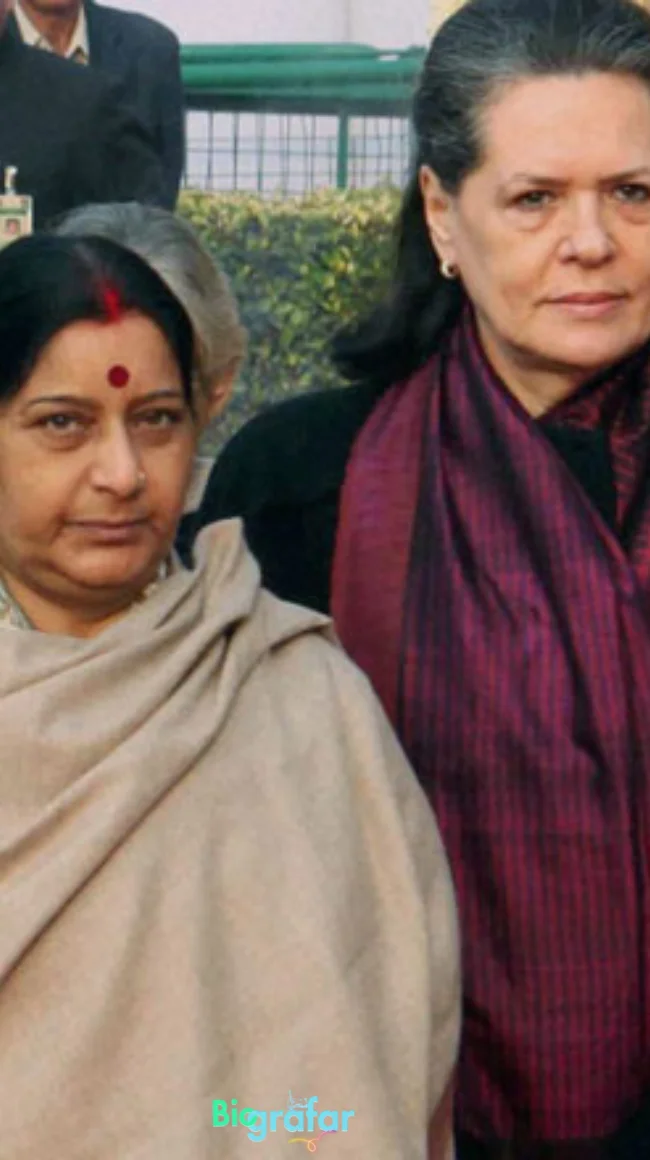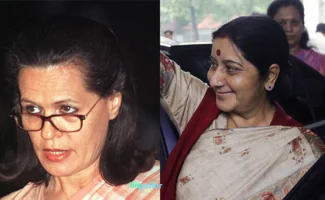Sonia Gandhi vs Sushma Swaraj: A Tale of Political Rivalry in India
Introduction
In the various shades of Indian politics, many battles have been as fierce and poignant as the one between Sonia Gandhi and Sushma Swaraj. These two dynamic women sculpted their places in history, leaving an unforgettable mark on India’s political geography. This blog delves into the interesting narrative of their political contest, a tale that continues to allure the nation
Sushma Swaraj's Ascendance:
On the other side of the political diapason, Sushma Swaraj was steadily rising within the species of the Bharatiya Janata Party( BJP). Known for her poetry, fierceness, and fidelity to her party's testament, Swaraj had come a prominent figure in the BJP. She was known for her principled stage on colorful issues and her capability to connect with the millions. Her political trip was embedded in the Rashtriya Swayamsevak Sangh( RSS) and the Akhil Bharatiya Vidyarthi Parishad( ABVP), and she had constantly worked her way over in the BJP.The crossroad of Paths: The late 1990s marked the crossroad of Sonia Gandhi's and Sushma Swaraj's political paths. Both women had come stalwarts of their separate parties, with Sonia Gandhi leading the Congress Party and Swaraj being a prominent leader in the BJP. This crossroad was not just a matter of particular contest; it represented the broader ideological clash between the Congress and the BJP. Sonia Gandhi's leadership of the Congress Party represented the temporal and socially progressive values that the party had historically upheld. In discrepancy, Sushma Swaraj was an influential voice in the BJP, which supported a more conservative and Hindutva- driven testament. The clash between these two testaments formed the background for their political contest. Congress vs. BJP Ideological Clash : The contest between Sonia Gandhi and Sushma Swaraj wasn't simply a particular or political clash; it was deeply embedded in the larger ideological battle between the Congress Party and the Bharatiya Janata Party( BJP), two of India's most influential political realities. This ideological clash was central to their political contest, shaping the silhouettes of Indian politics during their period.The Congress Party's Ideology: Sonia Gandhi, as the leader of the Congress Party, represented the values of denomination and social weal programs. The Congress had a literal heritage of backing the principles of a different, temporal, and inclusive India. It emphasized the significance of accommodating India's rich shade of societies, persuasions, and languages. Denomination was a foundation of the party's testament, emphasizing the equal treatment of all religious communities and fostering a sense of concinnity among India's different population. also, the Congress Party was known for its commitment to social weal programs. It supported for profitable reforms that aimed to hoist the depressed and marginalized sections of society. The party's vision included poverty relief, pastoral development, and a focus on education and healthcare to ameliorate the lives of ordinary citizens.The BJP's Vision of Hindutva: In discrepancy, Sushma Swaraj, a prominent leader of the BJP, supported the party's vision of Hindutva and a more conservative approach to governance. The BJP, embedded in the Rashtriya Swayamsevak Sangh( RSS), supported for Hindutva, which encompassed the creation of Hindu artistic and religious values. It emphasized a more assertive assertion of India's Hindu identity. The BJP's approach to governance was frequently more conservative, aligning with traditional artistic values. It sought to promote a sense of pride in India's ancient heritage and traditions. This included a strong station on issues related to artistic and religious identity.Impact on Indian Politics: The ideological clash between these two parties, as externalized by Sonia Gandhi and Sushma Swaraj, had a profound impact on Indian politics. It not only determined their policy positions but also told their electoral strategies, alliances, and crusade narratives. This contest came as an exemplification of the broader ideological divisions within Indian society. It stressed the differing fancies for India's identity, culture, and governance. The political battles between the Congress and the BJP frequently revolved around these ideological differences, and Sonia Gandhi and Sushma Swaraj were crucial numbers in this ongoing hassle


Genesis of the Rivalry:
The contest between Sonia Gandhi and Sushma Swaraj had its origins in the late 1990s, a period of significant political change and turbulence in India. To understand the depth of this contest, it’s pivotal to claw into the circumstances that brought these two influential women to the van of Indian politics.
Sonia Gandhi’s Emergence:
Sonia Gandhi, an Italian- born woman who married into India’s famed Nehru- Gandhi political dynasty, set up herself suddenly thrust into the world of Indian politics. Her trip began with tragedy as her hubby, Prime Minister Rajiv Gandhi, was tragically assassinated in 1991. At the time, Sonia Gandhi had maintained a low- profile, fastening on her family and staying down from the political limelight. still, the loss of her hubby marked a turning point.
In the fate of Rajiv Gandhi’s assassination, there was immense public sympathy for Sonia Gandhi. The Congress Party, a political hustler with a rich history, honored her eventuality to be a significant political figure. Sonia’s original disinclination to enter politics ultimately gave way to her acceptance of the part, primarily to save her hubby’s heritage and the Congress Party’s ideals. Her Italian origin came a point of political contention, with her opponents questioning her felicity to lead an Indian political party.
Electoral Face- Offs :
The contest between Sonia Gandhi and Sushma Swaraj set up its most dramatic expression in the electoral battlefield. Electoral face- offs handed the stage for some of the most memorable and nearly- watched moments in Indian politics, and one similar iconic battle took place during the 1999 general choices.The 1999 General choices: In the lead- up to the 1999 general choices, both Sonia Gandhi and Sushma Swaraj decided to dispute from constituencies that were representational of their parties' strength and significance. These contests weren't just about winning a administrative seat; they were emblematic of the broader ideological struggle between the Congress and the BJP.Sonia Gandhi's Training in Bellary, Karnataka Sonia Gandhi chose to dispute from Bellary, a administrative constituency in Karnataka. Bellary had literal and political significance as a region known for its strong Congress presence. Sonia's decision to dispute from this constituency was strategic and aimed to emblematize the Congress Party's traditional strength in the region.Sushma Swaraj's Training in South Delhi : On the other side, Sushma Swaraj decided to dispute from South Delhi, a high- profile civic constituency. South Delhi was considered a fort for the BJP, and Swaraj's training from this constituency was a testament to her fashionability and the party's base in the civic areas. Heritage of the 1999 Face- Off : The electoral face- off in 1999 between Sonia Gandhi and Sushma Swaraj left a lasting heritage. It showcased the energy of Indian republic, where leaders of public elevation could dispute from different constituencies, each with its unique political dynamics. This battle wasn't just about winning or losing a seat; it was about emblematizing the strength and reach of their separate parties. The Sonia- Sushma face- off in the 1999 general choices will always be flashed back as a defining moment in Indian politics, where two important women leaders stood at the van of their parties' ideological battles. It was a memorial of the significance of electoral republic in India and the influence of leaders in shaping the nation's political geography
Parliamentary Debates:
Within the confines of the Indian Parliament, Sonia Gandhi and Sushma Swaraj, two of India’s most influential political numbers, regularly engaged in superheated debates. These administrative sessions weren’t just routine conversations but rather memorable exchanges that stressed their strong leadership rates and fidelity to their separate testaments.
Eloquent lawyers Sonia Gandhi and Sushma Swaraj were famed for their poetry and articulation. They held the remarkable capability to eloquently present and defend their party’s positions. Their speeches were marked by clarity, conviction, and a knack for connecting with both their fellow parliamentarians and the general public.
Party Representatives As prominent leaders of their separate political parties, Sonia Gandhi and Sushma Swaraj constantly acted as the sanctioned spokespeople during administrative debates. This vital part established them as the face of their parties, entrusted with passionately articulating their party’s station on pivotal issues.
Critical Debates These debates were far from routine or procedural. They frequently revolved around matters of public significance, ranging from profitable programs and social weal to public security and governance. similar debates weren’t just rhetorical jousts but embodied the broader ideological clashes between their political parties. Influence on Administrative issues Their substantial influence within the Parliament allowed Sonia and Sushma to muster support for their party’s positions. Their interventions held significant weight and frequently had a profound impact on the direction of legislative opinions and policy- timber.
Leadership Roles:
Sonia Gandhi’s Leadership of the Congress Party:
Sonia Gandhi’s entry into Indian politics and her leadership of the Congress Party sparked violent debate and contestation due to her Italian origin. Her decision to lead the party, particularly as a foreign- born leader, came a point of contention and a content of discussion within political circles and among the public. Despite the original dubitation and enterprises raised, Sonia Gandhi assumed the part of Congress Party leader and played a significant part in the party’s direction and decision- timber.
Sushma Swaraj’s Prominent Positions :
Sushma Swaraj held several prominent positions within the Bharatiya Janata Party( BJP) and the government. Her career line saw her rise to the position of the Leader of the Opposition in the Lok Sabha, where she served as the voice of the BJP in the lower house of Parliament. subsequently, she assumed the vital part of Minister of External Affairs in the Indian government, a position of substantial responsibility on the global stage.
These leadership places allowed Sushma Swaraj to leave an unforgettable mark on Indian politics and tactfulness, while Sonia Gandhi’s leadership of the Congress Party was necessary in shaping the party’s programs and strategies. Both leaders, in their unique ways, contributed significantly to the political geography of India.
Conclusion:
The Sonia Gandhivs. Sushma Swaraj political contest remains a fascinating chapter in Indian political history. It symbolizes the larger ideological battles in the country and the enduring strength of women in Indian politics. While Sushma Swaraj is no longer with us, her heritage lives on, and Sonia Gandhi continues to be a significant figure in Indian politics. Their story is a testament to the rigidity and determination of women leaders in a virile- dominated political arena